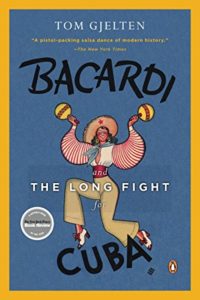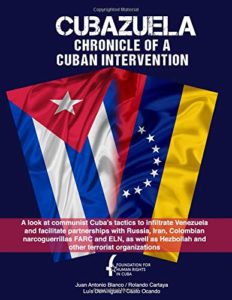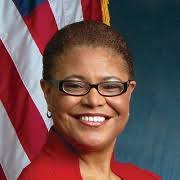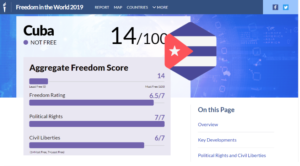The #Castro regime has aged badly. Cuba’s rum was legendary, before the regime stole it to finance their repression. Now every bottle sold keeps Cuba’s dictatorship in power longer.
Are you still enjoying that mojito? pic.twitter.com/ly1pOWd8Vj
— Michael G. Kozak (@WHAAsstSecty) July 28, 2020
Now that the combined efforts of Nicolas Maduro and the Cuban communist economic advisors have destroyed the wealth of Venezuela, it is affecting Cuba profoundly, according to Ambassador Michael Kozak, Acting U.S. Assistant Secretary for Western Hemisphere Affairs.
“Note that even as Venezuelans face extreme shortages at home, they continue to ship oil, diesel, gasoline, food, and medicine to Cuba,” he said in a briefing this week.
 Kozak warned against consuming Cuban rum and cigars, claiming that two of the island’s most iconic products help finance the country’s Communist “dictatorship,” AFP adds.
Kozak warned against consuming Cuban rum and cigars, claiming that two of the island’s most iconic products help finance the country’s Communist “dictatorship,” AFP adds.
“The #Castro economy relies on the theft of private property and the repression of the people. Regime-made Cuban rum and cigars are luxuries that are not worth the human cost,” he tweeted on Monday (above). “The #Castro regime has aged badly. Cuba‘s rum was legendary, before the regime stole it to finance their repression,” he added.
The Cuban economy is being hard-hit by both Venezuela’s economic crisis, which has reduced Venezuela’s support for Cuba, increased U.S. economic sanctions, and the economic shutdown in response to the COVID-19 pandemic, says a recent report from the Congressional Research Service. Before COVID-19, the Economist Intelligence Unit estimated the Cuban economy would contract 0.7% in 2020; it is now projecting an 8.3% decline. The global contraction in economic growth, trade, foreign investment, and tourism likely will slow Cuba’s post-COVID-19 economic recovery.
Cuba’s communist leaders have been promising for years to ease restrictions on their tightly controlled economy. Now the pandemic may be forcing them to actually do that. The regime has dropped a 10% tax on dollar transactions to encourage Cubans to give up their stashes of dollars mostly sent from family abroad, NPR’s Carrie Kahn reports.
 They have a liquidity crisis, said Ted Henken of Baruch College in New York. This is a quick way that they can transfer the money that’s in the pockets of Cuban citizens and/or their relatives abroad to fill up its empty coffers so that it can buy things abroad.
They have a liquidity crisis, said Ted Henken of Baruch College in New York. This is a quick way that they can transfer the money that’s in the pockets of Cuban citizens and/or their relatives abroad to fill up its empty coffers so that it can buy things abroad.
Progressive foreign policy groups are forming a new Alliance for Cuba Engagement and Respect, or ACERE – to push for better relations with Cuba, after an attempt to roll back the Trump administration’s economic sanctions on the island nation failed in the House of Representatives, writes Matthew Petti, a national security reporter at the National Interest.
But Rep. Karen Bass, the five-term House lawmaker and chair of the Congressional Black Caucus, has shed any illusions she ever had about the regime. In an interview on MSNBC, she walked back a years-old characterization of the late Cuban dictator Fidel Castro as “Comandante en Jefe,” Politico reports.
 “I have talked to my colleagues in the House about that, and it’s certainly something that I would not say again,” Bass said.
“I have talked to my colleagues in the House about that, and it’s certainly something that I would not say again,” Bass said.
“I happen to believe that sometimes the best way to change a regime is through having relations versus not,” she added, calling the Castro regime’s legacy “very troubling” and citing her work with the National Endowment for Democracy — the nongovernmental organization that promotes democratic reforms in Cuba and elsewhere abroad.
Cuba’s authorities committed numerous rights violations in June 2020 against people organizing a protest over police violence, effectively suppressing the demonstration, according to Human Rights Watch:
 Many Cubans planned to gather in Havana and other parts of Cuba on June 30 to protest the June 24 killing by police officers of 27-year-old Hansel Ernesto Hernández Galiano in Havana. Cuban authorities said that policemen found Hernández Galiano stealing and shot him as he was fleeing and throwing stones at the police. Ahead of the planned protest, Cuban authorities harassed and detained scores of people, and accused some of the crime of “spreading an epidemic.” Some dissidents reported that their cellphone data and phone service were interrupted beginning on the morning of June 30, in what appeared to be targeted restrictions. The protest was effectively suppressed and did not take place.
Many Cubans planned to gather in Havana and other parts of Cuba on June 30 to protest the June 24 killing by police officers of 27-year-old Hansel Ernesto Hernández Galiano in Havana. Cuban authorities said that policemen found Hernández Galiano stealing and shot him as he was fleeing and throwing stones at the police. Ahead of the planned protest, Cuban authorities harassed and detained scores of people, and accused some of the crime of “spreading an epidemic.” Some dissidents reported that their cellphone data and phone service were interrupted beginning on the morning of June 30, in what appeared to be targeted restrictions. The protest was effectively suppressed and did not take place.
“Arbitrarily detaining people to prevent them from demonstrating peacefully shows what the Cuban government is willing to do to stop critical voices from being heard,” said José Miguel Vivanco, Americas director at Human Rights Watch. “This is part of a broader pattern in which Cuban authorities will find any excuse – in this case, the pandemic – to treat dissent as a crime, instead of establishing ways to allow peaceful protests to occur safely.







